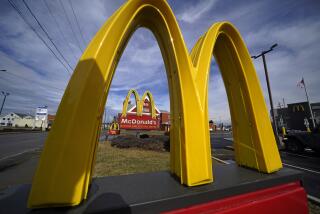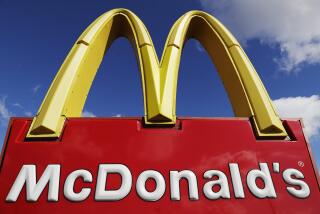Super-sizing the gluttony
- Share via
These are not happy times in the home of the Happy Meal.
McDonald’s stock price has been in free fall. The company has announced plans to close several hundred restaurants. Its share of the fast food market is declining. At the end of last year, McDonald’s reported its first-ever quarterly loss.
Sales of Happy Meals themselves have declined three years in a row, and a survey by Restaurants and Institutions Magazine ranked McDonald’s 15th in food quality at hamburger chains, behind -- among others -- In-N-Out (my favorite fast-food burger), arch-rival Burger King (how humiliating) and White Castle (whose small, square burgers are really inedible paperweights).
Things are so bad that McDonald’s last month signed up Paul Newman to help save its bacon ... er, burger ... er, salad with a new, so-called “Premium Salad” line that will be served exclusively with Newman’s Own dressings.
Locally, residents in Glassell Park are opposing construction of a new McDonald’s in their neighborhood. In Alabama, the Equal Employment Opportunity Commission filed a federal lawsuit last month, accusing a McDonald’s franchisee of violating the Americans With Disabilities Act by refusing to promote a 32-year-old mother of two because she has a dark purple birthmark covering her face.
I have to admit that I’m taking great pleasure in all Ronald McDonald’s difficulties. I don’t like McDonald’s. I’ve never liked McDonald’s. And no, I’m not a food snob who refuses to eat anything less refined than foie gras. I love hamburgers. And hot dogs. And pizza. Not to mention barbecue ribs, submarine sandwiches, fried chicken, pastrami sandwiches, tuna fish and various other kinds of food that are both (a) American and (b) consistent with the basic McDonald’s formula.
Ask almost any McDonald’s customers why they go there, and you’re likely to hear some variation of, “It’s cheap, quick, convenient and consistent.” A few might even say they like the food -- especially the French fries. I like McDonald’s fries too. But I think a Big Mac has about as much in common with a real hamburger as Salisbury steak does with a prime porterhouse.
*
Bigger isn’t better
But it’s not just the taste of McDonald’s food that bothers me. McDonald’s has always seemed to me to symbolize (and to encourage) the worst aspects of the relationship that many Americans have with food.
With its standardized, cooked-in-advance, squat-and-gobble philosophy, McDonald’s invites a utilitarian, food-as-fuel approach to what should be one of life’s great pleasures. It also encourages both gluttony and timidity.
Americans are fatter than ever. More than 65% of us are either overweight or obese -- including more than 25% of Americans under the age of 19, a figure that has doubled in the last 30 years.
McDonald’s, with its super-size and “extra value” meals, has played a major role in this obesity epidemic. A serving of McDonald’s fries, for example, carried 200 calories in 1960, according to Greg Critser’s recent book “Fat Land: How Americans Became the Fattest People in the World.” Now you can buy a super-size order, which has 610 calories. Hamburgers and other McDonald’s staples have ballooned similarly, and their customers -- more than 20 million people eat at a McDonald’s every day in this country -- have become so accustomed to these big portions that they forget what a normal portion size is and gorge at home as well.
In New York, McDonald’s was actually sued by two teenagers who claimed that the fast-food chain made them fat by deceiving them about the high levels of fat, sugar, salt and cholesterol in their food.
A federal judge dismissed that silly lawsuit in January, pointing out that anyone should know that eating “copious orders of super-size McDonald’s products is unhealthy and may result in weight gain.”
It is not the court’s job, the judge ruled, to protect people from “their own excesses.”
Quite so. But I suspect there will be similar, more narrowly targeted consumer lawsuits against McDonald’s.
McDonald’s is not alone, of course, in trying to induce customers to buy burgers and other food items that appear to be on steroids. It’s now quite commonplace -- and not only at fast-food restaurants. Steakhouses serve slabs of meat the size of unabridged dictionaries. And just look at the “bargain” prices -- and the sizes! -- for large soft drinks and popcorn in your neighborhood movie theater. Last week, I saw someone with a cup of Coke so huge that I was surprised when he asked for a straw instead of a diving board.
*
Loyal to a fault
But McDonald’s is the pioneer -- and the leader. There are more than 30,000 McDonald’s outlets serving 46 million people a day in 119 countries -- all numbers far greater than any other food service retailer in the world. Eric Schlosser, in his book “Fast Food Nation,” says the Golden Arches are now “more widely recognized than the Christian cross.”
McDonald’s is so ubiquitous and so predictably consistent that many Americans -- not a notoriously adventuresome lot at the table to begin with -- will often go to McDonald’s when traveling to new places, instead of trying local specialties, be it barbecue in Memphis or bratwurst in Berlin.
One of the benefits of travel is the opportunity to have new experiences, to broaden one’s horizons, to learn about different cultures. Mealtime is the ideal time for this. But I know families -- even pretty sophisticated families -- who decide, as the lunch or dinner hour approaches on vacation, that they or (more likely) their children just have to go to McDonald’s.
What better way, though, to introduce children to a new culture than over local food? And I don’t mean you have to force your 6-year-old to eat boiled monkey nostrils.
My son enjoys trying food that’s completely different than what he has at home, but parents of more finicky eaters usually know what kinds of food their children like (or dislike), and they can always find something sufficiently comparable, if necessary, in virtually any foreign cuisine.
That’s a problem, of course, if the parents themselves are picky eaters, so devoted to McDonald’s and other plasticized food that they have created and indulged their children’s timidity at table.
I know, I know. I should blame the parents, not McDonald’s. McDonald’s is a business; how can I blame a business for coming up with a successful business formula? OK. I do blame the parents. But I also blame McDonald’s.
Now, if you’ll excuse me, it’s lunch time as I write this, and I’m off to In-N-Out for a double-double, animal style, with well-done fries.
*
David Shaw can be reached at david.shaw@latimes.com.
More to Read
Inside the business of entertainment
The Wide Shot brings you news, analysis and insights on everything from streaming wars to production — and what it all means for the future.
You may occasionally receive promotional content from the Los Angeles Times.










